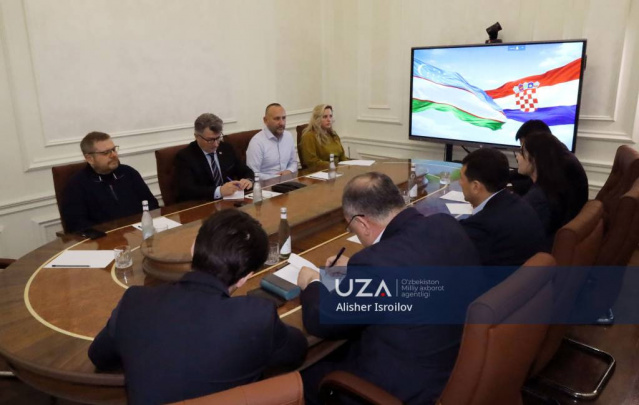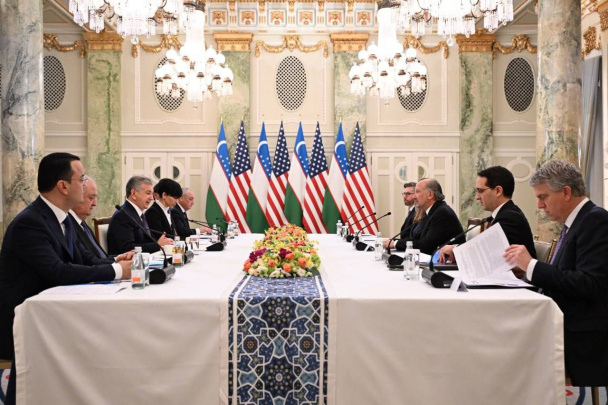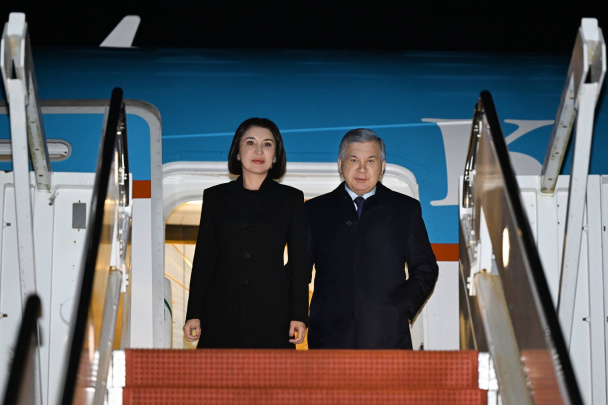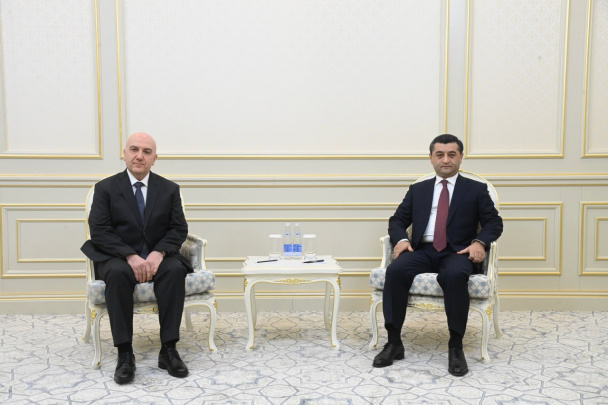Weekly Digest: Arab-Islamic Summit, COP29, Climate Expo, and more
This week covers President Mirziyoyev's participation in the Arab-Islamic Summit in Riyadh and COP29 in Baku, focusing on Uzbekistan’s diplomatic efforts and development initiatives. Highlights include discussions on regional peace, renewable energy projects, climate strategies, and strengthened partnerships with Saudi Arabia, the EU, and neighboring countries. Key agreements on green energy, trade connectivity, and sustainability underscore Uzbekistan's growing role in international cooperation.
Arrival in Riyadh
On November 11, President of Uzbekistan Shavkat Mirziyoyev arrived in Riyadh, Saudi Arabia, for an official visit to participate in the extraordinary Arab-Islamic summit.
Upon arrival at King Khalid International Airport, he was warmly received by Prince Mohammed bin Abdulrahman bin Abdulaziz, the governor of Riyadh Province, along with senior Saudi officials.
Arab-Islamic Summit: Addressing Regional Tensions
The summit, hosted under Saudi Arabia’s leadership, brought together key Arab and Islamic leaders to address urgent regional issues, focusing on diplomatic solutions to de-escalate tensions in Gaza and Lebanon.
Speaking at the summit, President Mirziyoyev underscored the importance of peaceful resolution to the Middle East conflict. He reaffirmed Uzbekistan’s support for a two-state solution, advocating for the establishment of an independent Palestinian state within the 1967 borders, with East Jerusalem as its capital.
Mirziyoyev praised Saudi Arabia’s leadership in forming a global alliance backing the two-state solution and highlighted Uzbekistan’s humanitarian commitment to provide free medical treatment for Palestinian women and children affected by the ongoing violence.
The President also called for enhanced international aid for civilians in Gaza and Lebanon, emphasizing the role of the United Nations and other global organizations in addressing the crisis.
He further urged the preservation of Jerusalem’s cultural and historical heritage, particularly the sacred Al-Aqsa Mosque, as a symbol of global unity and respect.
Strengthening Bilateral Relations
On the sidelines of the summit, President Mirziyoyev met with Saudi Crown Prince and Prime Minister Mohammed bin Salman Al Saud.
The leaders reviewed progress in bilateral cooperation, noting significant developments in trade, investments, and joint ventures across green energy, transport modernization, communications, agriculture, and industry.
The discussion also included preparations for the second Central Asia-Gulf Cooperation Council Summit scheduled for 2025 in Samarkand. This event aims to strengthen regional partnerships and promote shared development goals.
Mirziyoyev expressed gratitude for Saudi support in facilitating Hajj and Umrah pilgrimages for Uzbek citizens, highlighting the cultural and spiritual significance of these efforts.
Advancing Energy Partnerships
In a separate meeting with Saudi Arabia’s Minister of Energy, Prince Abdulaziz bin Salman Al Saud, President Mirziyoyev discussed strengthening green energy partnerships.
The discussions highlighted the success of Saudi company ACWA Power in Uzbekistan’s energy sector, focusing on accelerating wind and solar power projects and advancing green hydrogen production.
Both parties agreed to intensify efforts in enhancing local energy efficiency and promoting renewable energy initiatives, positioning Uzbekistan as a regional leader in sustainable development.
COP29 Summit in Baku
President Shavkat Mirziyoyev of Uzbekistan participated in The 29th session of the Conference of the Parties to the United Nations Framework Convention on Climate Change COP29 in Baku, emphasizing the urgent need to combat climate change, particularly its severe impact on Central Asia.
Highlighting Uzbekistan’s commitment to reducing greenhouse gas emissions by 35% by 2030 and achieving carbon neutrality by 2050, he detailed national strategies such as expanding renewable energy to 40%, launching green hydrogen projects, and increasing forested areas through the “Green Space” initiative.
Mirziyoyev proposed several global initiatives, including an International Center for Climate Loss and Damage Assessment, a UN-backed agricultural innovation hub, and a genetic resource bank to enhance crop resilience. He also announced a multilateral agreement to export green energy to Europe, advancing Uzbekistan’s regional climate strategy.
On the sidelines, he met European Council President Charles Michel to discuss deepening EU-Uzbekistan ties and Finland’s President Alexander Stubb to enhance industrial and environmental cooperation. Talks with the European Bank for Reconstruction and Development and the Islamic Development Bank focused on investments in green energy, infrastructure, and sustainable development.
A landmark agreement with Azerbaijan and Kazakhstan to export renewable energy further underscored Uzbekistan’s commitment to global climate action. With over 20 events at Uzbekistan’s National Pavilion, the country showcased solutions for ecological challenges, renewable energy, and youth engagement in sustainability. The summit highlighted Uzbekistan’s leadership in fostering regional and global partnerships for a greener future.
Uzbekistan is set to launch the Climate Expo exhibition and establish the “Aral Valley” Climate Technology Expo Hub, aiming to drive sustainable development and attract international collaboration in the Aral Sea region. A planned open-air “Aral Nature Laboratory” in Muynak will enhance research and innovation.
The Ministry of Ecology announced a draft resolution to promote “green entrepreneurship” in the region by introducing environmental innovations and climate technologies by 2030. The Expo Hub will focus on cultivating drought-resistant plants and producing export-ready goods to boost Uzbekistan’s climate-resilient agricultural sector.
The China-Kyrgyzstan-Uzbekistan railway project, estimated to cost up to $8 billion, may receive funding from the European Bank for Reconstruction and Development (EBRD).
The railway, linking China with Central Asia, will enhance regional trade and connectivity, with construction costs shared among the three countries. Uzbekistan and Kyrgyzstan hold a 24.5% stake each, while China has a 51% majority share.
UAE-based Masdar finalized an agreement for a 1000 MW wind power plant in Navoi’s Uchkuduk district during COP29. The facility is expected to generate 3.5 billion kWh annually, saving 1 billion cubic meters of natural gas and reducing carbon emissions by 1.4 million tons per year. Construction will create up to 800 jobs, boosting local employment.
Uzbekistan’s gold production reached 119.6 tons in 2023, ranking the country 10th globally, according to the World Gold Council. However, the country dropped to 98th place out of 114 countries in the 2024 EF English Proficiency Index, reflecting a continued decline in English proficiency.
The U.S. and Uzbekistan held a strategic partnership dialogue in Washington, where the U.S. announced a $500,000 grant to preserve Samarkand’s Registan Square. In aviation, Centrum Air has announced the launch of direct flights from Tashkent to Colombo, Sri Lanka, while Flyadeal received authorization to connect Saudi Arabian cities with Uzbekistan.
Meanwhile, workers from Enter Engineering and Saneg raised concerns over months-long unpaid wages, violating labor laws requiring payments at least twice a month. The issue has sparked online protests, urging swift action from employers.
Related News

11:04 / 20.02.2026
Croatia considers opening consulate in Samarkand

07:14 / 19.02.2026
President Mirziyoyev holds talks with U.S. Commerce Secretary in Washington

11:41 / 18.02.2026
President Shavkat Mirziyoyev arrives in the U.S. to attend first Peace Council Summit

17:28 / 16.02.2026




